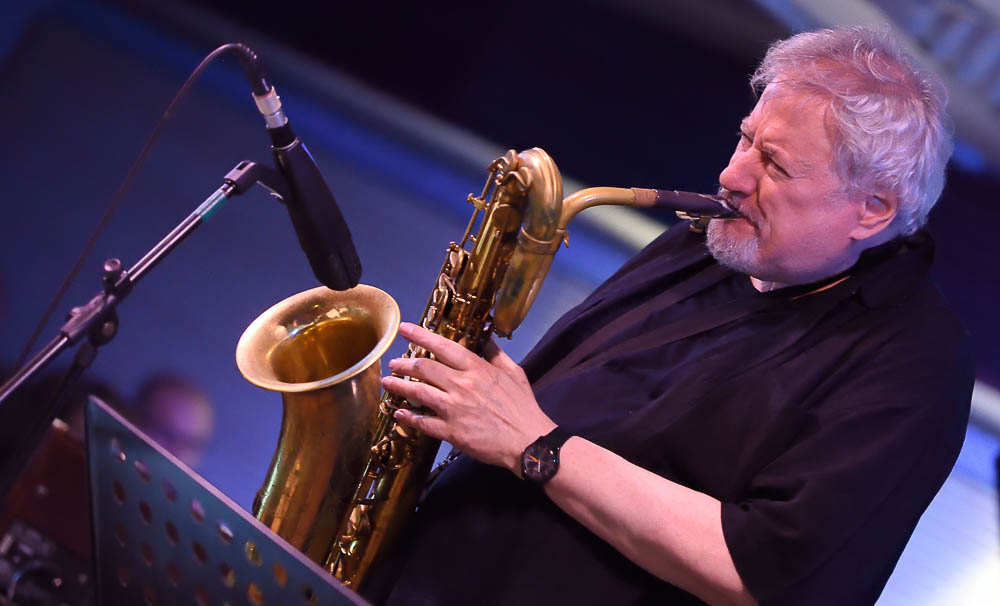Ronnie Cuber: In the Land of the Giants

There’s a legacy in jazz of certain “Giants”, from generation to generation, who occupy the position as “King of the Mountain”. For example, it started in the early days on trumpet with “Pops” (Louis Armstrong) to Roy (Eldridge) to Dizzy(Gillespie) to C.T. (Clark Terry) to Wynton (Marsalis) today. There’s always a back and forth between musicians and aficionados (for example, Fats, Clifford, Freddie, and Woody are royalty), but a consensus “Heavyweight Champ” emerges. Overtime each instrument evolves its own “Land of the Giants”. The history of the Jazz Baritone Saxophone has a similar trajectory. Harry (Carney) to Pepper (Adams) and Gerry (Mulligan) to Ronnie (Cuber) and now, as the legacy continues, Gary (Smulyan).
We’re here to talk about and celebrate a man who reigned supreme on the biggest axe in the band for decades. The overarching characteristics of Ronnie Cuber’s immense artistry were a cutting edge sound, complete technical virtuosity, and a limitless stream of fluid, fluent, and inventive improvisational ideas. He covered all the bases in Jazz, Afro-Caribbean, Funk, Soul, and beyond. He was electric on the bandstand and impeccable in the studio. Ronnie Cuber wasn’t a saint, but was, and always will be, a giant.
He might have started on Clarinet and Tenor Sax, but the Bari Sax became his authentic voice. This being said, there are some shining examples of him on Soprano (with Eddie Palmieri on “Harlem River Drive, for example). Let’s be clear. At the heart of it all Ronnie was a stone cold bebopper. He was a devotee of all things Bird, Dex, Newk, Max, Miles, Monk, Mingus, Trane, you name it.
He had an encyclopedic knowledge of the Bebop, Post-Bop, Modern, and Jazz standard repertoire. He channeled all that knowledge and then adapted and grafted it on the Bari Sax.
The truly unique thing about Cuber is he didn’t stop there, as a ripping Jazz soloist. He was also a master of the Afro-Caribbean idiom as well. He had perfect time and understanding of clave, cascara, tumbao, and the complexities of the traditional Afro-Cuban forms. Eddie Palmieri utilized Ronnie Cuber’s genius time and again on some of the most classic recordings in the history of Salsa and Afro-Caribbean jazz.

Guess what? He kept on burning with an intuitive and all encompassing mastery of Soul, Funk, Rock, and Pop music. Ronnie was a truly soulful cat who was shaped by and steeped in the Blues. Another facet of his genius was the ability to craft his playing and mold it stylistically to fit perfectly in any context. You needed down home Blues? Ronnie had it. You needed Soul? Ronnie had it. You needed some laser cut Funk? Ronnie had it. You needed Beans and Rice? For sure, Ronnie had it. You needed some Trane, Wayne, JoeHen, modal pentatonic, matrix burn? That’s right, Ronnie Cuber had it all.
Ronnie was also a unique character. He came up through the Big Band tradition with Maynard, Slide, and the Chopper (Woody Herman), culminating with 25 years with the Mingus Big Band. He had been through the grinder that included thousands of one nighters on the road with bad food, crummy hotels, no sleep, chiseling business deals, and the maze of depravity that the journeyman musician has to face.
Ronnie paid his dues. These experiences gave him an edge and a crustiness that was legendary in musician circles. If you didn’t come right in on your solo break he would say, “Hey man, don’t be sleepwalking back there. You got to hit it and get it. Save the spacey shit for your own gig. You dig?” He loved to challenge his compatriots. A lot of it was muscle flexing. I played hundreds of gigs and recordings with Ronnie. First with Eddie Palmieri and Paul Simon, then with the Mingus Big Band, with Randy Brecker and the Metropole Orchestra, sitting in with Dr. John, and my own “Latin Side” projects. One time, to get under my skin, he told me “Man, I don’t really dig your ‘Byzantine’ arranging style. Too many 4ths and 5ths”.
He really stung me so I told him, “Put your horn down Ronnie, we got to settle this outside”. When he saw I was serious he looked at me and said,”Bro, you know I’m only kidding. Wayne and Trane had their Byzantine thing, I’m just messing with you”. We ended up tighter than ever. It was all Ronnie’s way of keeping you on your toes and checking out if you had the confidence to stand your ground.
All of this, the musical knowledge, stylistic mastery, and hard edged character, raised the bandstand. Ronnie was going to burn. It was always electric. He truly molded his own unique style and innovated on the Baritone Saxophone. He learned from the masters and left a legacy and point of departure for the next generations. In every way he earned his place in the “Land of the Giants”.